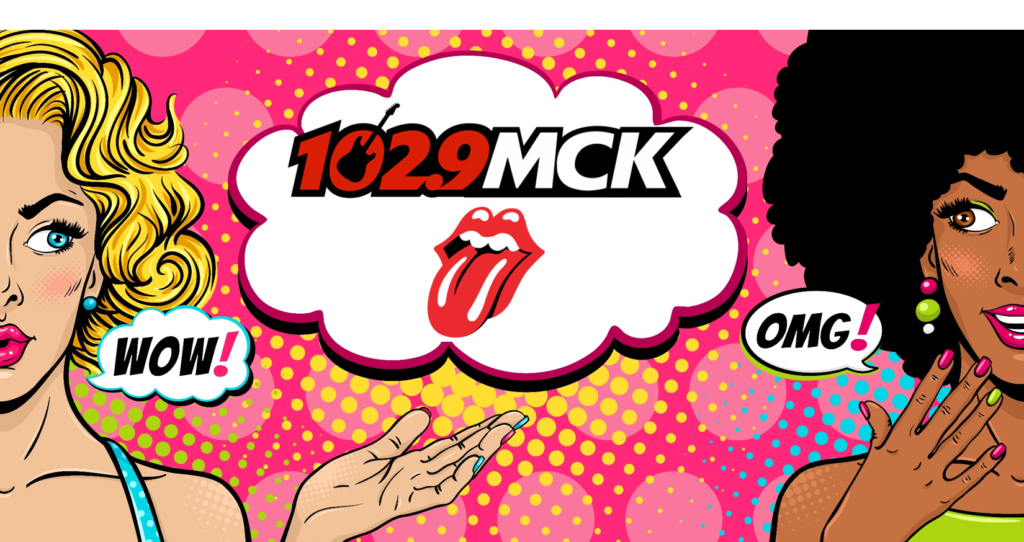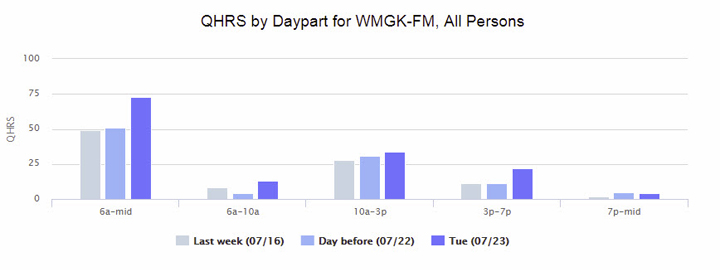
The headline of today’s post might just have well as been:
Radio Rediscovers That Good Programming Wins In PPM
In case you missed it, WMGK (Beasley’s Classic Rock station in Philly) did the unthinkable this week – they threw out their usual format, put their call letters on the shelf, and for one day became wall-to-wall Rolling Stones under their “new” moniker – WMCK. The day-long tribute to Mick Jagger and the Stones in honor of the band’s concert at the Lincoln Center wouldn’t have raised a lot of radio eyebrows, except for one thing:
It killed in PPM.
How do we know that? It’s a little known fact that Nielsen and Media Monitors produces next day ratings in PPM markets. Called “Audio Overnights,” the service allows broadcasters to actually see results of what they did yesterday.
Thanks to Inside Radio, the results of WMGK’s (or WMCK’s) Stones stunt was not just impressive – it was spectacular. And it should prove to be a philosophical game-changer for programmers in PPM markets who ascribe to the 5-word philosophy of boredom:
Set it and forget it.
Like folklore, passed from generation to generation, it became a radio programming truth that blandness, banality, and sameness was the way to win in PPM. Stations that dropped in “Oh wow!” elements became rarities in metered markets, and “good programming” became synonymous with tight playlists, numbing consistency, and music scheduling prowess.
That’s not programming.
Programming is what PD Bill Weston and his live & local WMGK staff pulled off on Tuesday. And perhaps the most remarkable thing about this stunt is not that it worked, but that other PDs were surprised at the results.
And lest you think the entire day was simply one great Stones song after another, “WMCK” flipped all its daily benchmark features to the Stones-inspired theme of the day. “Breakfast With The Beatles” became “Scones With Stones,” for example, keeping the theme of the day consistent – while showing the station has a sense of humor.
The WMCK stunt worked, compared to an average Tuesday (or the day before) on WMGK:

But Nielsen/Media Monitors proved another Classic Rock truth – the format is often as popular with younger demos as it is with those who grew up with an iconic band like the Stones. On WMCK Day, 25-34s were the leading demo, coinciding with all those Millennials paying big bucks to see a bunch of 75 year-old rockers prancing around the stage.
Not surprisingly, Weston integrated his staff of knowledgeable, trusted sherpas – his airstaff – to provide coverage, color, context, and excitement. Andre Gardner broadcast live from the Lincoln center, while Debbi Calton wrote an extensive blog/review of the show that appeared on the station’s website.

So, let’s review 7 lessons learned from WMGK’s Stones stunt:
1. Music and culture are lifestyles – not demographics – As we continue to see in Nielsen ratings – both diary and PPM, Classic Rock isn’t just a Baby Boomer format. But to grasp that reality, simply attend an Elton John, Who, Aerosmith….or Stones concert when they come to your town and “research” the crowd. By the way, Nielsen Music’s webinar on Wednesday confirmed the appeal of Classic Rock music to America’s youth. It’s “pan-generational appeal” is underscored by the fact than fans of Rock are 34% Millennials, 33% Gen Xers, and 28% Baby Boomers (and older). Weston expanded his station’s demographic appeal by speaking to the larger cultural moment – rather than being tethered to a format.
2. Live & local works – Every time I hear a pundit extol the virtues of voicetracking, while diminishing broadcast radio’s ability to personalize music with a life airstaff, I shake my head. On Tuesday, WMCK proved that radio can be more interesting, fun, and compelling than a Stones channel on Pandora. The reason why DeBella, Gardner, Calton, and the rest of the MGK air aces made this stunt work is because of their day-in-day-out connection between the station, Philly, and the hometown audience.
3. Capturing the local zeitgeist – It may be Programming 101, but it’s become all too rare.  Promotion/marketing gurus like Paige Nienaber preach the wisdom of radio being in the moment, talking about what the community is talking about. How risky was it to flip WMGK into an all-Stones station on Tuesday? In retrospect, it was a slam-dunk, but if it was that simple, why don’t more stations seize the moment?
Promotion/marketing gurus like Paige Nienaber preach the wisdom of radio being in the moment, talking about what the community is talking about. How risky was it to flip WMGK into an all-Stones station on Tuesday? In retrospect, it was a slam-dunk, but if it was that simple, why don’t more stations seize the moment?
4. Showing up – You’ve heard the old adage from Woody Allen: “80% of success is showing up.” That axiom also applies to radio. It’s not just enough to play “Shattered” and “Satisfaction” all day long. Showing up at Lincoln Center, having the airstaff attend and cover the concert, and having presence earn brand image points for a station like MGK. And apparently, it works in the ratings, too.
5. Online & on-air – A look at many station websites and apps reveals a world frozen in boring consistency. Oftentimes, radio fails to sync up its digital assets with its OTA programming. Calton’s review of the concert and the station’s graphic department made sure WMCK wasn’t just coming out of the speakers, but also out of screens.
6. Surprise, surprise – The best thing about Spotify, Pandora, and other pure-plays is that you can be the program director, assembling and arranging wonderful, personalized playlists. The worst thing is that you always know what’s coming. And that’s why the element of surprise may even play better among the younger demographics. We hear it in focus and LAB groups, and now you can see it in PPM. What the late WPLJ PD, Larry Berger, used to call “logged spontaneity,” programmers need to think beyond the boundary lines, walking that line between “oh wow” and “oh no.”
7. This isn’t just a Classic Rock thing – Today’s headline in Inside Radio indicates that Radio (capital R) is in dire need of a programming shakeup. At yesterday’s CRS 360° webinar, Country programmers Chris Huff and Joey Tack concurred their format is in a rut. Huff pointed to “a lot of sameness” in radio programming, while Tack posited that “We are going to have to break some rules that have been sacred because the audience is breaking them.” They should talk to Bill Weston.
Of course, none of this means that changing call letters, breaking format, and programming out of the box is something that radio can successfully pull off every day, much less every week.
But it’s also an affirmation the audience is looking for more from the radio they listen to. Joey Tack asked the question, “What can we deliver that they can’t get anywhere?”
Answer: WMCK
It’s time to start programming again.
Postscript: Congrats to 26-year WMGK veteran, Debbi Calton, on her upcoming retirement later this year. Debbi will be the focal point of a well- deserved month-long celebration of her career in November.
deserved month-long celebration of her career in November.
Debbi hasn’t just been the midday jock of WMGK – she is one of the best and connecting with her audience. I’ve seen tons of research for the station over the years, and no one has established a warmer relationship with her listeners and her community than Debbi Calton.
- Media And Technology In 2025: Believe It Or Not! - April 18, 2025
- In Radio, You Just Never Know - April 17, 2025
- The Secret To Making A Great Podcast (And Great Radio) - April 16, 2025




What a fun day/night that was, Fred! All afternoon long listeners would come up to our tent yelling, “M-C-K…YEAH!!” When I got off at 7 I had a few hours to kill until the Stones came on, so I walked through the parking lots and hung with the tailgaters on my the way to grab dinner. As I walked past one open rear car hatch after another, I was blown away that M-C-K blasting out of speakers everywhere I could hear. I knew then that we were onto something for sure.
Great stuff, Andre. Best to you and the entire “MCK” staff!
Fred, Great piece on a great idea. Putting “The Wow” back into radio is what it’s all about. The Wow Factor does this too…every day!
Best,
John Sebastian
Much appreciated, John.
Fred,
Consultants have a reputation of homigenizing radio.
I Love the fact that you’re OUTSIDE that box! EVERY station(regardless of format) needs to shake it up on a semi-regular basis….and surprise it’s listeners with fun, local stunts just like this!
And bless PPM for being behind us!
Have a great weekend!
I walk a fine line, JC, and truth be told, I straddle the box. I do stress the things you read in this post, but not every station has the “horses,” talent, or resources to do these kinds of things. They work when the execution is stellar. But when they’re thrown together or not thought through, they can have the opposite effect. Appreciate the comment.
How did WMMR do? I listened to them before the show and loved all the old interviews and the content.
I’m sure they did fine, Mark. They always do. But I have not seen overnight data on them.
Ok if you do I would love to see it! WMMR is my go to in Philly!
Great idea executed by a talented group of broadcasters.
Yes, indeed. You can relate.
I absolutely love this stuff Fred, brilliant programming. Its stunt programming at its best! Thanks for sharing this…
See you in Victoria this Fall, would love to buy you a big Canadian latte!
Ross Winters
Director of Programming
Jim Pattison Broadcast Group
Ross, you’re on! Thanks for the kind comments.
First of all, I was on my way to the show on Tuesday night and had “M-C-K” cranked! I was singing along at the top of my lungs as I pulled into that 30 dollar parking lot (LOL) at the Linc. It was an amazing stunt, and as typical with Bill and his team – from imaging to the DJs who were so into it, and music selections – it was excellently executed. Hats off, indeed!
Fred, you hit all the reasons why this kind of stunting works. The overarching resonance as to why these kinds of things can work so well is the emotional connection the band’s music has with demos of all ages. The Stones have broad demo appeal as you point out; there probably aren’t many classic bands that have the timelessness and catalogue and appeal.
Over on our side of the dial, we’ve been doing deep dive programming stunts several times annually for the last decade. We did 13 hours of the Stones last summer as part of our special Throwback Thursdays summer programming and we doubled our AQH and increased daily cume that day by almost 40%. And we saw a significant bump in the 25-34 year old demo.
Yes, it is all about the programming, and yeah even in public radio where some folks would say we have no rules, there still are “rules.”
Since January we’ve been doing a weekly deep dive on one year at random for five hours every Saturday. The increase in cume/AQH and ATE are impressive. Our Throwback Thursdays add to the overall effect. Sure, the numbers look great for now, however the programming not only builds audience but it also connects us more closely to our community of members, who find a lot of emotional comfort in what we’re doing. It’s this loyalty and value that public radio members support with their dollars.
Finally, to your point about breaking the rules, admittedly we don’t have the same “pressures” that many commercial stations have. But what public radio does have in common are bills to pay and most importantly local communities to connect to. MGK did an amazing job with that day, and congrats to them for breaking the rules. Even when they don’t break the rules, they’re awesome at what they do.
They don’t call it classic rock for nothing!
Bruce, as always, you are a gracious competitor and a great observer of the music scene, whether it’s Indie Rock or the Rolling Stones. You appreciate great radio, commercial or public, and XPN is one of the reasons why the Philly market is fortunate to have stations like yours. You and Bill exemplify “coopetitionn” – you both have radio’s welfare at heart despite the fact you’re on different sides of the aisle.
Thanks as always for the astute comment, and for everything you do to make broadcast radio live, local, and engaged.
In line with the enduring popularity of Block Party weekends and Christmas programming.
But if you do it all the time…
I remember the audience going nuts at both 91X and WFNX when we did a U2 A-Z weekend.
If, like Jesus, you have a big enough artist, let the ratings begin!
You’re right, Max. You can’t eat a banana split every day. Even THEY get boring. But that every-once-in-a-while moment especially coinciding with something meaningful happening in town (or in the world) can create ratings bonanzas. We never saw it “print” in the diaries for the most part, but PPM can capture these remarkable moments in time. Thanks for the comment.
Thank you Fred for the coverage and insight. (And thanks to all for the comments and feedback.) While WMGK is generally a reliable radio soldier, on 102.9MCK Day we turned into a special forces agent with pockets filled with C4. The rule breaking vibe coupled with the sticky ‘what’s up next’ component and fueled by a city-wide anticipation of this major summer event at 8pm- one that many felt to be the last opportunity at seeing the Stones on this scale… all brought together in savory splendor in the classic rock crock pot. Plus it was fun as hell around the station in pulling it all off.
Bill, kudos again, to you and the staff. And it should be heartening to everyone reading this blog that a seasoned veteran programmer like yourself can truly enjoy and get off on these events. Appreciate you chiming in.
Good live programming with attention to your market will always win. Boring is boring – whether it’s the same food day after day, or the same ‘ol same, ol on the radio.
Great post!
Many thanks!